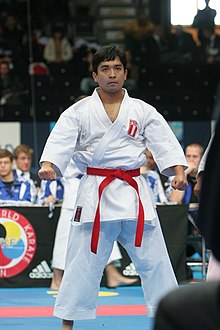Karate Belt Rank(Dan),Karate Belt Level
What is the Rank or Dan meaning in karate or martial arts
and what is the highest Dan in Martial arts?
In 1924 adopted Gichin Funakoshi founder of Shotokan Karate
and Dan system of Kano,
the founder of Judo Jigoro using rank system with a limited set of karate belt
colors. Other Okinawan teachers also adopted this practice. System Kyu / Dan
grades for beginners start with Kyu higher numbered (for example, Q-10 Jukyū)
and progress towards less Kyu numbered. Evolution Dan lasts from 1 (Shodan, or "the
beginning of Dan ') to the higher Dan. Referred Kyu grade karateka as" karate
belt colors "or mudansha (" including without Dan / rank "). Referred
Dan grade karateka that yudansha (owners Dan / rank). Yudansha usually wear a
black belt. requirements vary from rank patterns, organizations, and schools. kyu
ranked position of stress, balance, and coordination. added speed and power at
the top of the stairs.
Minimum age and time in rank or Dan are the factors that affect
supply. Test consists of a demonstration techniques before a panel of examiners.
This varies depending on the Martial arts school, but testing may include everything learned
at that point, or just new information. The demonstration is an application for
a new rank (shinsa) and may include Kata, bunkai, self-defense, routines, and
tameshiwari (break), and / or kumite (sparring).
The Karate belt system
System is used belt in karate training and martial arts to
celebrate student progress made in their studies. Students begin in low rank
of the belt (white in First Dan) and progress through the ranks (Kyu and Dan) to
make it to the top (black belt in highest Dan) to guide students to him / her
self. They have to pay through the ranks to show their honor. Forward and belts,
and must show that they are willing to do a belt examination. Can involve exams
belt sets of Kata and fighting other members of the Dojo, or other tests that
show the efficiency of the martial art .
Black belt in martial arts is the belt given for the highest
Dan in Karate and most of Martial arts.
In martial arts, black belt is a way to describe graduated
from the field where it was marked in many cases the level of practitioner by
the karate belt colors. Black Belt is the most common karate belt colors used
belt up and indicates the degree of efficiency. And is often associated with
the degree of education although more often than not the highest grade or "expert"
public perception.It is also a relatively recent invention, dating back to the
late 19th century, instead of the old habits .
 Red belt is the most
common of the assets of Japanese or Korean Martial arts . Such as Black Belt
more commonly known, and its use varies between the Martial arts, with most use
of the style's founder, Grand Master or other high rank, while others use it as
a black belt rank dan immediately before or even to indicate the novice who
does not carry the rank. In some schools, red belt signifies the ninth or tenth
degree Dan rank, where the tenth degree is the highest rank given in Martial arts .
Red belt is the most
common of the assets of Japanese or Korean Martial arts . Such as Black Belt
more commonly known, and its use varies between the Martial arts, with most use
of the style's founder, Grand Master or other high rank, while others use it as
a black belt rank dan immediately before or even to indicate the novice who
does not carry the rank. In some schools, red belt signifies the ninth or tenth
degree Dan rank, where the tenth degree is the highest rank given in Martial arts .
In most styles Okinawan Karate , and in some schools of
Kobudo (Okinawan weapons), is used red beltalternately and white Dan 7 and 8, while
the use of seat solid red to rank 9 and 10, which are honorary purely, can any
not be achieved by applying for the exam (and deaths) each. Dan 7, allows the
practitioner to use the Shihan title, which translates roughly as Grand Master.
Some, but relatively few, and karate techniques also use black belt and red
alternately for Dan 5 and 6 Dan .
Abstract:
Most martial arts schools rank students with white belt when
you are a beginner and a black belt when you reach expert status, with several
rows of belt between them. There is no specific Rank (Dan) system for all
martial arts, so you may want to talk with your teacher before buying a belt.











Post a Comment